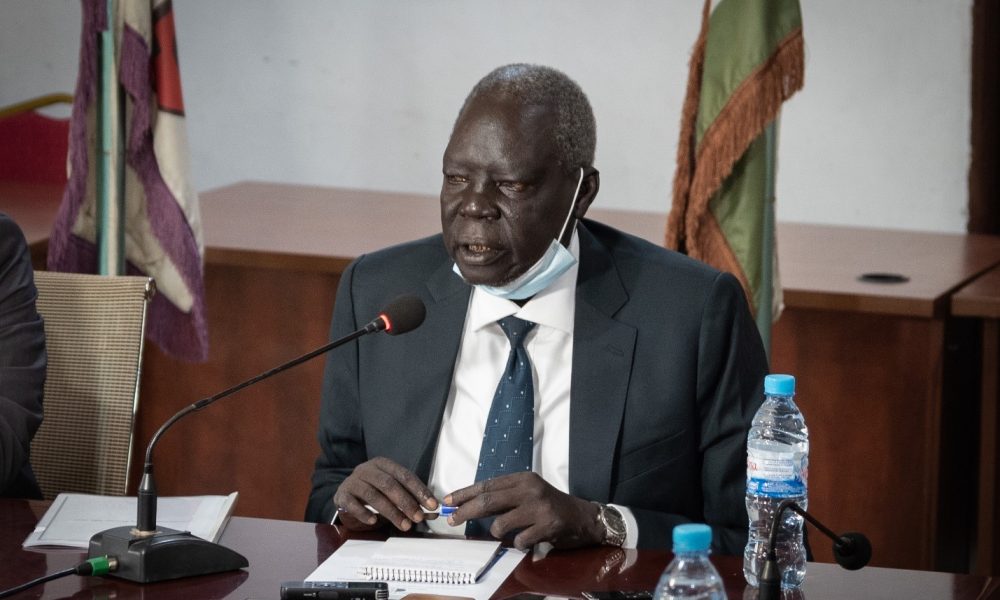By Ephraim Modi Duku Sokiri
Minister of Justice and Constitutional Affairs, Justice Ruben Madol Arol, has yesterday presented three national Bills to the Transitional National Legislative Assembly (TNLA) for further scrutiny and appropriation into acts. This is in line with the revitalized peace implementation provision of reviewing various national laws and bills.
“I am hereby, summiting the National mine authority bill, 2023 to the parliament after approval by the national council of minister resolution No. 74/2022 in its regular meetings No.16/2022 on Friday 23th sept, 2022,” he said.
The bills include The National Mine Action Authority Bill, 2023, The National Archives and Records Management Bill, 2023, and The National Public Health Institute Bill, 2022.
The first bill presented was the national mine action authority bill 2023 which consists of six chapters, and 21 sections.
In his first reading, the chapter one is preliminary provision (section 1-5) which deals with the titles and commencements, reveal and saving authority and application and adoption of words.
Chapter two provides establishment of powers, functions of the authority and dealers of mine action, (sections 2-8) which are explosive ordinance risks, education or mine risk, and humanitarian demining. (Survey, mapping, clearance of mine explosive remanence of war).
“The chapter also supports total ban on anti-personnel land mine,” he continued.
The third chapter provides structure of the authority, composition of powers and functions of the board (section 9-19) entailing for the appointment of the chairperson, and other members.
Chapter four provides finance, audit and reporting (section 20-24) that also gives for financial sources, the authority shall open and maintain bank accounts in the Central Bank and other commercial banks.
“It also provides for the accounts of the authority, be audited by the auditor general or whoever is delegated,” he added.
Chapter five, provides prohibition of used/filling, production and transfer of anti-personnel mine and cluster ammunition (section 25-26) which also identifies areas with such mines or suspected mines to be destroyed.
The Sixth chapter consist of Miscellaneous provision (sections 27-31). It provides the authority to initiate public hearings on matters, and address them as well empowers the authority to issue rules, regulations and procedures for effective and sufficient implementation of the bill.
After its presentation in the first reading Rt. Hon. Speaker of the TNLA, Jemma Nunu Kumba committed the bill to the legislation and justice and the defense and veteran committees and asked them to report back to the the august after two weeks.
The minster also passed second bill which is the national archives and records management bill 2023 in conformity with the constitutional legal and political driving principles, objectives and ideas in the Revitalized Agreement on the Resolution of Conflicts in South Sudan (R-ARCSS) and the transitional constitution of South Sudan 2011 as amended. It was enacted in accordance with provision of section A paragraph 28.
The bill provides establishment of archives, proper management of governmental institution data, reservations and use of records and archival heritage and other related matters. Consisting of 8 chapters and 39 sections.
Chapter one is preliminary provisions and dealing with titles and commencements, reveal and saving proper authority, application and adoption of words.
The second chapter provides establishment of powers and functions of national archives and records directorate (section 6-15). It as well explains establishment of advisory committee to advice the minister and oversee activities of the archives.
Chapter three provides records management (sections 16-19) to be responsible of creating and maintain adequate documentation and activities of the respective institutions through establishment of good records keeping and nomination of senior officials.
Chapter four affords management of public record and archives (sections 20-23) which allows the ministry after consultation with the private records acquired for national importance and for public interest to be declared as public record.
The fifth chapter entitles local governance records access to archives (sections 24-30), providing the chief executive of local governance to be responsible for administration of the records.
Financial provisions, sixth chapter (section 31-35) provides sources of funds for the directorate before the end of every financial year to prepare a budget and summit to the advisory committee for approval to be recommitted to the ministry.
Chapter seven, Offense and finalities (section 36) for removal and destruction or utilization of public records and archives and illegal export of historical documents and apply finalities.
Replay of public records and archives becomes the eighth chapter dealing with data that has been removed without proper authorization to be reclaimed by the directorate.
“The bill was committed to the committee of culture, museum, and national heritage and the committee of legislation and justice to report back to parliament after two weeks,” said the speaker.
The Third Bill presented was the National Public Health Institute Bill 2022, approved by the National Council of Ministers Resolution No. 62/2022 in their regular meetings No. 13/2022 on Friday 2rd sept, 2022 passed to be deliberated.
“The bill is top and institute to save as center for excellence for supervision, control and coordination of all matters relating to public health authority,” the justice and constitution affairs minister said.
It consists of six chapters and 41 sections. Chapter one also provides preliminary provisions (sections 1-5), dealing with titles and commencements, reveal and saving application and adoption of words.
Second chapter establishes the authority, objectives and structures, powers and functions of national public health institutions (section 6-9). And chapter three provides governance structures of the institute (section 10-22).
Chapter four gives executive director and its deputies (section 23-34) providing for the appointment and removal of their eligibilities, powers and functions.
The fifth chapter provides finance audit and report (section 25-37) that also gives for sources of funds for the institute and its bank accounts to be audited by the audit chamber. And the last chapter (sections 38-41) provides for ownership and intellectual property generated by the employees shall be properties of the institute.
The speaker committed the bill to committee of legislation and justice and specialized committee on health to be reported back to parliament after two weeks.




